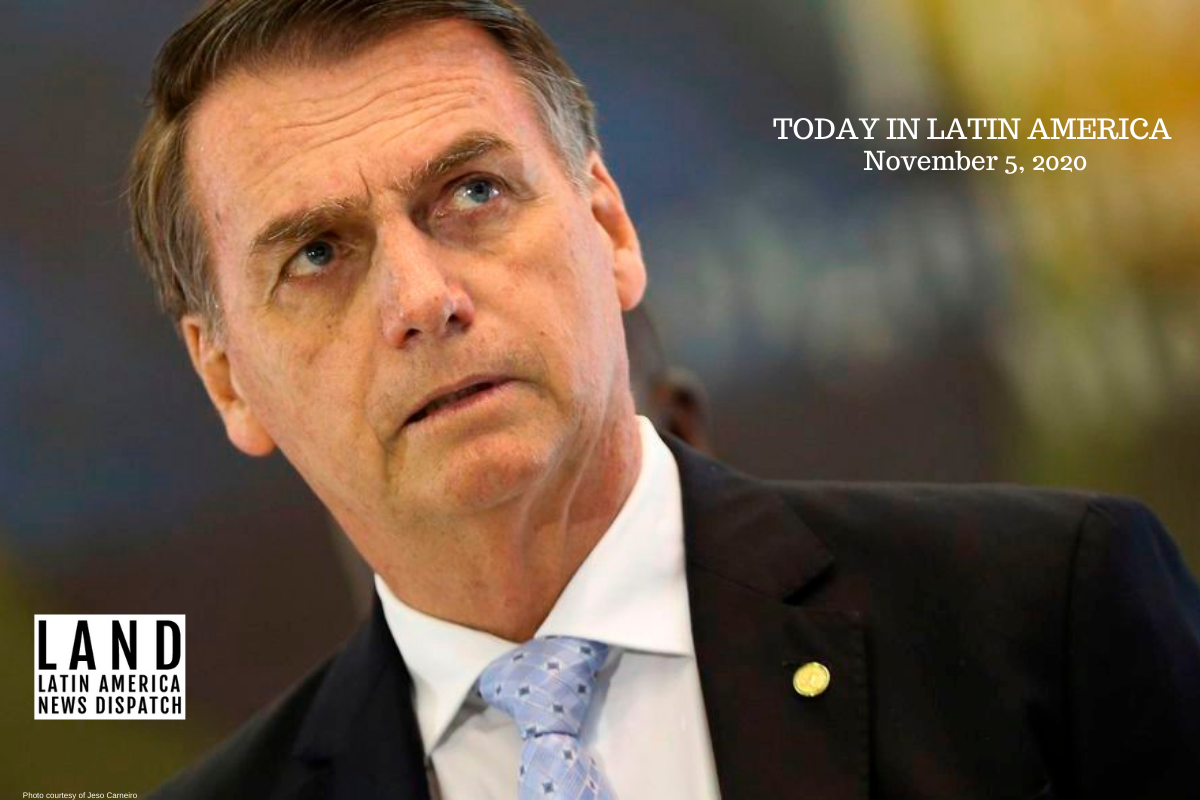BRAZIL: Flávio Bolsonaro, the eldest son of President Jair Bolsonaro, faces graft charges, prosecutors in Rio de Janeiro announced late Tuesday. He has been formally accused of embezzlement, money laundering, misappropriation of funds and directing a criminal organization—although Bolsonaro’s legal team calls the allegations against Flávio and 16 others “an ill-conceived tale.”
The 39-year-old senator’s affairs have been under the spotlight since his father’s January 2019 inauguration. Flávio has previously said the investigation is a politically-motivated attack on his father, particularly since the conservative leader rose to power on the promise of stamping out corruption. The latest accusations follow a chain of investigations over Brazil’s first lady, Michelle Bolsonaro, as well as Jair Bolsonaro’s other two politician sons, Carlos and Eduardo, who were allegedly involved with financial irregularities and the illegal dissemination of disinformation. President Bolsonaro has made no immediate comment and denies wrongdoing in all cases. The scandal could further delay Brazil’s planned economic reforms.
HEADLINES FROM THE WESTERN HEMISPHERE
SOUTHERN CONE
BRAZIL: President Bolsonaro reiterated his support for United States President Donald Trump on Wednesday, suggesting that Democratic challenger Joe Biden would interfere with Amazon-related issues. A Biden win could potentially complicate relations and jeopardize trade, with the environment and human rights at the top of the U.S.-Brazilian agenda. Bolsonaro, who has been coined the “Tropical Trump,” told supporters in Brasilia that he “[has] a good policy with Trump” and “[hopes] he will be reelected.” However, Bolsonaro has been advised by domestic aides to wait for official results before congratulating Trump on a win.
THE ANDES
PERU: A court in the city of Ica has acquitted an accused rapist because of the victim’s “suggestive” underwear color, sparking a national outcry. Judges threw out the rape case after concluding that the complainant’s choice of red underwear insinuated that she was “prepared or willing” to have sexual relations with the defendant. The decision, made on October 29, has taken Peruvian women to the streets. Some protestors wrapped red underwear around their legs, while others chanted “A Rapist in Your Path,” a feminist protest song, outside the Ica courthouse. The Control Office of Judiciary opened an investigation on Monday to assess misconduct on behalf of the judges. The identities of those involved in the case, which was first reported in January 2019, have remained confidential.
THE CARIBBEAN
HAITI: A kidnapped high schooler was found dead at a garbage dump site on Sunday, only four days after her capture. Officials found the beaten body of 22-year-old Evelyne Sincère, at a dump in Delmas 24. Her kidnappers had allegedly asked for a $100,000 ransom, but Sincère’s sister could only raise $15,000. At least seven people have been reported kidnapped in Port-au-Prince in the past three weeks. Four have been released, but two men —a church pastor and his son— are still being held hostage.
PUERTO RICO: Pedro Pierluisi, of the pro-statehood New Progressive Party, continues to lead the race to become Puerto Rico’s governor by a small margin over Carlos “Charlie” Delgado, of the Popular Democratic Party, by about 12,000 votes, with 95% of polling stations reporting. Although Puerto Rico’s Elections Commissions has not officially declared the results, Pierluisi declared victory Tuesday night, saying he will expedite the disbursement of billions of dollars assigned by Congress to help the island rebuild after Hurricane Maria. In the legislature, 10 candidates who are not affiliated with the island’s two major parties were elected. This represents a major blow to the New Progressive Party and the Popular Democratic Party, which have traded power for over 50 years.
CENTRAL AMERICA
REGION: At least hree people have died and dozens of fisherman are stranded at sea after Hurricane Eta broke through Central America Tuesday night. Conditions are too dangerous to rescue at least 60 fishermen off the coast of the Mosquitia region of Honduras. However, a boat was sent Wednesday to collect the body of a fisherman who died from a heart attack. The region endured intense landslides, killing one teenage girl in Honduras. In El Progreso, a prison flooded to waist level, and 604 inmates were transferred to local gyms. In Nicaragua, two miners were killed by a mudslide. Eta is one of the most powerful hurricanes to hit the region in recent years, making its landfall as a Category 4. The hurricane has now weakened to a tropical storm status and is expected to pass through Cuba and southern Florida.
NORTH AMERICA
MEXICO: Sonora congressmen voted to make the use of face masks in public mandatory on Tuesday, but the law does not establish any penalties if people fail to comply. The law includes commercial, service and industrial establishments, and states that entry can be denied to anyone who fails to wear a mask. Businesses are also required to provide customers with antibacterial gel and to take their temperature. Many other states already have these laws in order, although these have been implemented by state only. Over 5,000 new cases were reported on Tuesday by the federal Health Ministry, and the death toll stands at 92,000.
MEXICO: Puebla lawmakers approved same-sex marriage by a landslide on Wednesday after rejecting the proposal altogether last year. The law was passed 31-5, and officially changed gender specific references in the civil code. The passage relating to marriage in the civil code will now state that marriage is a civil contract by two persons, instead of “man and woman.”
***



